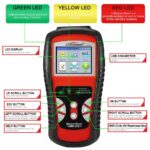Experiencing issues with your car’s Anti-lock Braking System (ABS) can be concerning. Warning lights on your dashboard are designed to alert you to potential problems, and the OBD2 (On-Board Diagnostics II) reader is a common tool for deciphering these warnings. However, you might encounter a frustrating situation: the ABS warning light is on, but your standard OBD2 reader shows no fault codes. This article delves into the reasons why ABS fault codes might not appear on a generic OBD2 scanner, even when there’s clearly an issue.
One of the primary reasons for this discrepancy lies in the limitations of standard OBD2 readers. While OBD2 systems are mandated for emissions-related issues across all modern vehicles, their coverage of other systems, like ABS, can be limited. Many basic OBD2 scanners are primarily designed to read powertrain (engine and transmission) related fault codes. They may not have the capability to access the ABS control module (often called EBCM or Electronic Brake Control Module) and retrieve its specific diagnostic trouble codes (DTCs).
Furthermore, ABS systems are complex and often manufacturer-specific. The diagnostic protocols and communication methods used for ABS modules can vary significantly between car brands and models. A generic OBD2 reader might not be equipped with the correct software or communication protocols to effectively communicate with your vehicle’s ABS module. Think of it like trying to speak a different language – the scanner and the ABS module simply can’t understand each other to exchange fault code information.
Another factor to consider is the type of ABS fault. Some faults might be intermittent or not severe enough to trigger a code that a basic OBD2 reader can detect. The system might register an anomaly internally but not deem it critical enough to broadcast as a standard OBD2 fault code. Additionally, some ABS issues might be related to mechanical components like wheel speed sensors or hydraulic components, which may not always generate a digital fault code readily accessible by a generic scanner.
In some cases, the problem might not be a failure to read the code, but rather the type of code being generated. Advanced ABS systems can generate manufacturer-specific codes that go beyond the standardized OBD2 protocols. These codes require specialized scan tools that are designed to communicate with the specific make and model of your vehicle. These professional-grade scanners, often used by dealerships and experienced mechanics, have deeper diagnostic capabilities and can access a wider range of fault codes, including those related to ABS, SRS (airbag system), and other vehicle subsystems.
Consider the experience of one DIY mechanic who encountered an elusive ABS issue. Despite the ABS warning light being illuminated, a standard OBD2 reader showed no codes. Upon further investigation, it was discovered that moisture had infiltrated the EBCM, leading to corrosion and poor solder joints on the circuit board. Resoldering these connections resolved the ABS problem. In this scenario, the fault might not have been a clear-cut, digitally reported error that a basic OBD2 reader could easily interpret, but rather a subtle electronic malfunction within the ABS module itself.
If you find yourself in a situation where your ABS light is on but your OBD2 reader shows no codes, it doesn’t mean there isn’t a problem. It simply indicates that your standard scanner might not be capable of accessing the specific ABS fault information. Here’s what you should do:
- Try a more advanced scan tool: Consider using a scan tool that specifically states it can read ABS codes, or consult a professional mechanic who has access to professional-grade diagnostic equipment.
- Check for visual signs of damage: Inspect wheel speed sensors, wiring harnesses, and the ABS module itself for any signs of damage, corrosion, or loose connections.
- Consult a repair manual: Your vehicle’s repair manual can provide specific troubleshooting steps for ABS issues and guidance on accessing diagnostic information.
In conclusion, while OBD2 readers are valuable tools, they have limitations, especially when it comes to complex systems like ABS. The absence of fault codes on a generic OBD2 scanner doesn’t rule out an ABS problem. It may simply mean you need more specialized tools or diagnostic procedures to uncover the underlying issue and ensure your vehicle’s braking system is functioning correctly.
